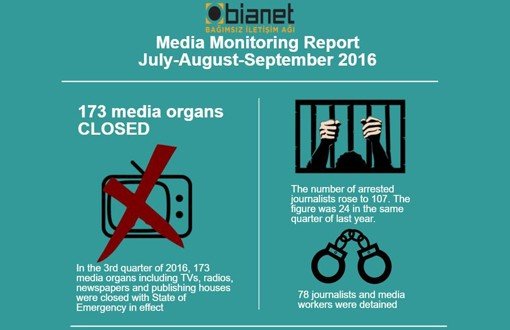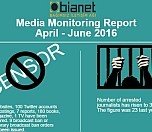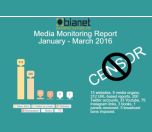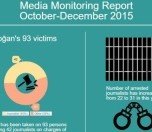Click to read the article in Turkish / Kurdish
After a break of two years, Turkey once again has become “world’s biggest journalist-prison” and ranked low in press freedom and transparency on international indices.
The State of Emergency (OHAL) declared following the coup attempt on July 15, and the Statutory Decrees (KHK) issued within the State of Emergency have brought various unlawful and excessive practices like closures, detentions and arrests among members of the Gülen Community and the Kurdish Media.
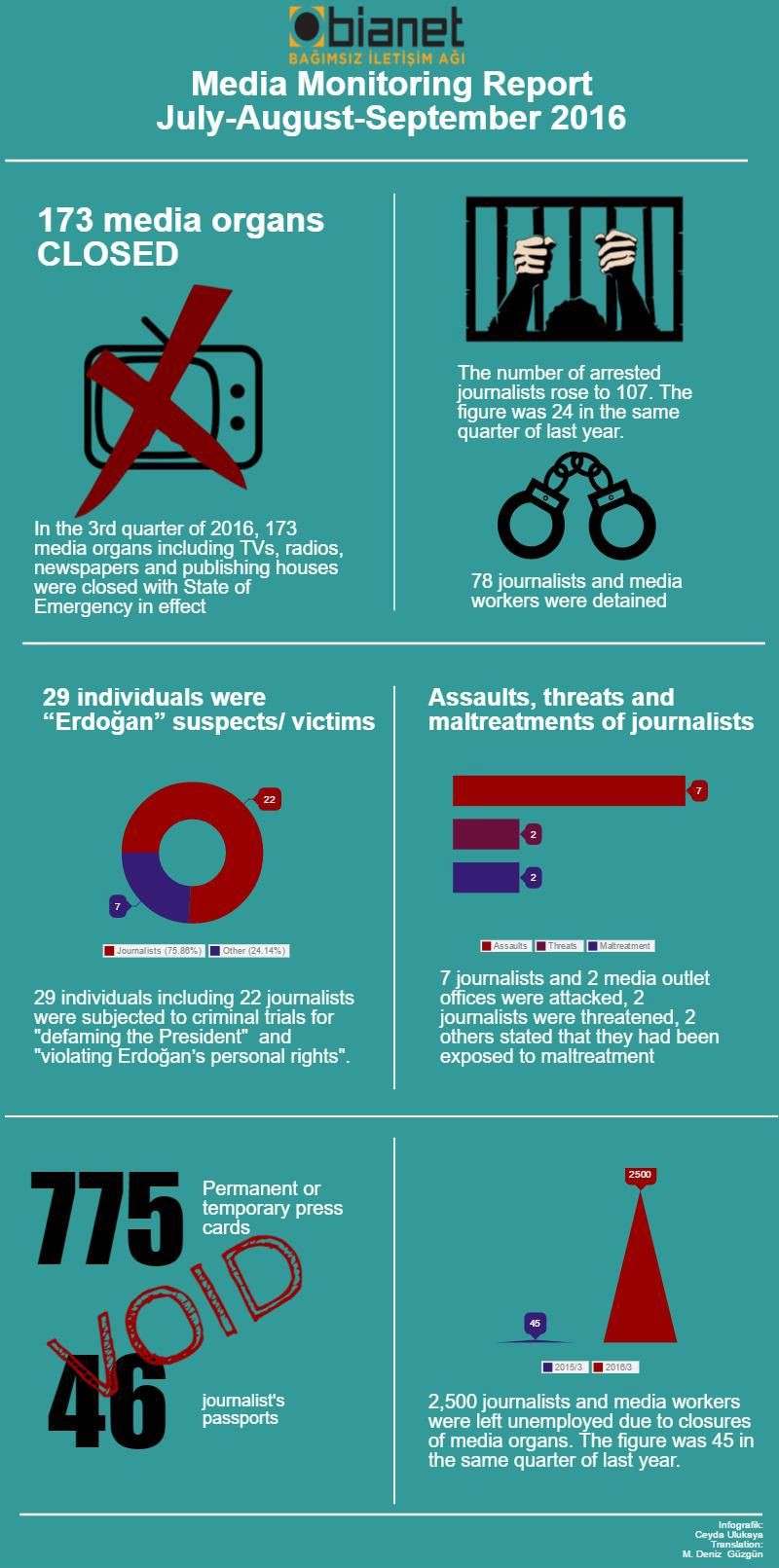 |
| Click to see the infographic |
The Government has often been criticized for “becoming distant from its goals of democracy” and “using the State of Emergency to speed up its ideological transformation process within the state-structure” at national and international levels.
BİA Media Monitoring Report 2016 July-August-September points out to the diversity and vastness of administrative and judicial interventions on the media in the third quarter of the year; 226 journalists face the risk of a life imprisonment and 2,235 years and 4 months in prison.
The report also demonstrates that 107 journalists and 10 distributors have entered October 2016 in prison, 78 journalists in custody and that 775 press cards and 49 passports have been revoked in the State of Emergency.
In these three months, action has been taken against 22 journalists for “defaming the President” or “defaming Recep Tayyip Erdoğan”. In accordance with Article 229 of the Turkish Penal Code (Defaming the President), two of these have been sentenced to a punitive fine of 3,130 euro each.
The report also demonstrates that in comparison to the last quarter, the number of the arrested journalists has risen from 24 to 106 the detentions from 49 to 78 and the unemployed from 45 to 2,500.
Highlights from the Media Monitoring Report
BİA Media Monitoring Report includes the chapters “Killed Journalists”, “Journalists Imprisoned”, “Assaults, Threats and Blockings”, “Investigations, On-going Trials, Verdicts”, “Defamation, Personal Rights and Claims for Damages”, “Bans, Closures and Pull-offs”, “Constitutional Court”, “European Court of Human Rights (ECtHR)”, ”Radio and Television Supreme Council (RTÜK)” and “Supreme Election Board (YSK)”.
During these three months, the lawsuits brought against journalists on grounds of both the Turkish Penal Code (TCK) and Anti-Terror Law (TMK) have continued. The charges pressed against journalists, distributors and media outlet workers in these trials were “being a member of an armed organization”, “aiding an [illegal] organization” as well as “forming, conducting and controlling an [illegal] organization”.
Majority of journalists imprisoned are from Gülen Community-owned media
107 journalists and 10 distributors have entered October 2016 in prison. 71 of these journalists work for Gülen Community-owned media outlets and 29 others as well as all of the distributors are from the Kurdish media. The aforementioned have been sent to prison on charge of being a member of an [illegal] organization.
In the same quarter of 2015, 24 journalists and 9 distributors were in prison. 13 of the journalists and all of the distributors were from the Kurdish Media.
70 of the 107 journalists imprisoned have stood trial on charges of being members of “Fethullahist Terrorist Organization (FETÖ) / Parallel State Organization (PDY)”, 28 others for being members of “Group of Communities in Kurdistan (KCK)”, “Kurdistan Workers’ Party (PKK)” and “Democratic Patriotic Youth (DYG)”, 2 others for being a member of “Marxist-Leninist Communist Party (MLKP)”, 1 for being a member of “Revolutionary Peoples’ Liberation Party-Front (DHKP-C)”, 1 for being a member of “Resistance Movement”, another one for being a member of “Turkey Communist Labour Party/Leninist (TKEP/L)”, 1 journalists for “spying” and another one for “providing/destroying classified information” and another one for “violating prohibited military zone”. 1 journalist was put on trial for being a member of “Ergenekon Organization Mersin Arm, Turkish Revenge Union Organization and the Inner Organization” at the same time.
Of the 107 journalists in prison, 82 are under investigation, 18 are convicted, 1 other was convicted by a local court and still waits for the decision of Supreme Court of Appeal, 5 others are still being tried.
9 assaults, 3 threats and 2 maltreatments
In the third quarter of 2016, 7 journalists and 2 media outlet offices were attacked. In addition, 2 journalists were threatened, and 2 others stated that they had been exposed to maltreatment.
In the same quarter of 2015, 21 journalists, 3 media organs and 1 newspaper printing house had been attacked, 20 journalists, as well as 7 media organs had been threatened.
In the entire year of 2015, In the entire year of 2015, 3 Syrian journalists and 1 newspaper columnist had been killed; 64 journalists, 4 media organs and 1 writer had been assaulted. In addition to that 38 journalists and 21 media organs had been threatened.
State of Emergency: 78 detentions, 24 custody orders, 6 house raids
In the third quarter of 2016, 78 journalists and media workers were taken into custody and then released, custody order was issued for 24 journalists and houses of 6 journalists were raided. 1 journalist is under house arrest.
In the same quarter of 2015, 49 journalists and media workers were taken into custody and the figure was 120 for the entire year of 2015.
29 individuals including 22 journalists were “Erdoğan” suspects/victims
In the 3rd quarter of 2016, 4 of the 6 journalists standing trial on charges of “defaming the President” in accordance with Article 299 of the Turkish Penal Code (TCK) were acquitted, 2 others were sentenced to a punitive fine of 3,130 euro each.
In this quarter, 29 individuals including 22 journalists were subjected to criminal trials in accordance with Article 299 (Defaming the President) and 125 (Defaming Erdoğan as a public official due to the performance of his public duty) of the Turkish Penal Code as well as to lawsuits claiming damages due to violation of Erdoğan’s personal rights.
Upon President Erdoğan’s declaration following the coup attempt on July 15, that he would withdraw the charges he had filed against approximately 3,000 individuals, some individuals were released in certain provinces including Antalya and Ankara.
In the previous quarter of 2015, 15 journalists and 1 lawyer stood trial in accordance with Article 299 of the Turkish Penal Code for “defaming President Erdoğan” in their articles, criticisms and expressed opinions. In this term, there were no new investigations launched and cases brought to trial on same charges. Time will tell what will happen with the charges Erdoğan has withdrawn.
In the same quarter of 2015, 4 individuals including 1 journalist were sentenced to 7 years, 9 months and 25 days in prison (4 years deferred), 23 individuals in total including 11 journalists were still standing trial over their articles, criticisms and expressed opinions on same charges. New investigations were launched on same charges in accordance with Article 299 against 19 journalists and there were 3 new criminal complaints filed. A verdict of non-prosecution was filed for four journalists.
In the entire year of 2015, 9 persons 5 of whom were journalists had been sentenced to 10 years, 8 months and 22 days in prison in total on charges of defaming President Erdoğan (Art. 299 TCK), 19 persons 14 of whom were journalists and 2 were caricaturists had been sentenced to 10 years, 9 months and 27 days in prison on charges of defaming President Erdoğan in his Prime Ministerial term (Art. 125(3) TCK). As a result, 28 persons in total including 19 journalists and 2 caricaturists had been convicted for defaming Erdoğan.
173 media organs closed; 775 press cards, 49 passports revoked
In the third quarter of 2016, in which the effects of the State of Emergency became evident, press cards of 775 journalists and passports of 46 journalists were revoked. The passports of arrested academic and columnist Şahin Alpay’s daughter and journalist Can Dündars wife Dilek Dündar were seized. In addition, request has been made to seize the passports of 5 other journalists.
In these three months, 155 media organs (TV; radio, newspaper, publishing house) were closed, 3 (temporary) media blackouts were imposed, 18 websites were closed and 4 websites were censored. There were 7 cases of intervention on media broadcast/publications, 2 journalists were deported and 1 newspaper was pulled off.
In the same quarter of last year (2015), 101 websites, 40 Twitter accounts and 178 URL based news articles were censored. In addition to 1 media blackout, 3 TV channels, 3 humor magazines, 2 books and 1 film were censored and at least one discrimination case in accreditation had occurred.
In the entire year of 2015, the media experienced 6 blackouts, 5 confidentiality and 10 accreditation discriminations. In addition, 118 websites, 353 Twitter accounts, 399 news articles and columns as well as 21 TV channels and 2 journalists had been subjected to censorship. 12 footages, 7 books, 5 humor magazines, 4 movies, 2 magazines, 2 journalists, 1 documentary film, 2 leaflet, 1 panel, 1 commemoration, 1 election film, 1 banner and 1 image had been censored.
Defamation: 4 journalists stand trial facing 55 years in prison
In the third quarter of 2016, 4 journalists stood trial facing in total 55 years in prison.
In the same quarter of last year (2015), 1 journalist was sentenced to 3 years and 6 months in prison, the cases brought against 10 journalists and 2 newspapers were still continuing and 3 new criminal charges were pressed. 1 newspaper was sentenced to pay compensation in amount of 1,500 euro for damages due to violation of personal rights and 5 journalists stood trial seeking 342,350 euro compensation payment in total. A new lawsuit was brought against 1 journalist seeking 30,050 euro in damages.
In the entire year of 2015, 15 journalists and 1 news site had been sentenced to 5 years, 8 months and 17 days in prison and 15,280 euro of punitive fine (540 euro deferred). 3 journalists have been sentenced to compensation payment of 4,330 euro in total for violating personal rights.
TMK/TCK: Life imprisonment and 2,152 years in prison demanded for 191 journalists
In the 3rd Quarter of 2016, 117 journalists were tried in accordance with the Anti-Terror Law (TMK) facing 880 years and 6 months in prison. 61 journalists stood trial demanding 1,036 years in prison on charges of “conducting [illegal] organization”, “being a member of an [illegal] organization” and“aiding an [illegal] organization”. 5 journalists are being tried facing 10 years in prison on charge of violating Article 301 (insulting Turkey, the Turkish nation, or Turkish government institutions) of the Turkish Penal Code.
The trials of 6 other journalists facing a sentence of life imprisonment and 216 years and 6 months in prison on charges of “providing and disclosing confidential documents regarding security of the state” still continued and 2 others were still being tried “inciting people to hatred and hostility” and 1 journalist for “violating the confidentiality of a trial”. The punishment demanded for all above mentioned charges equals to 1 life imprisonment and 2,152 years in prison in total.
In this quarter, 32 journalists and rights advocates involved in the symbolic one-day act of solidarity with Özgür Gündem daily were put on trial on charge of “propagandizing for the terrorist organization”. Verdict of non-prosecution was rendered for 10 of these cases, 8 others are still on trial.
In the same quarter of last year (2015), 28 journalists stood trial in accordance with the Anti-terror Code facing 430 years and 6 months in prison. New investigations were launched or criminal complaints were filed against 4 journalists and 18 books on the same basis. 60 journalists in total were being tried on charges of “conducting [illegal] organization”, “being a member of an [illegal] organization” and“aiding an [illegal] organization” facing 546 years and 6 months in prison.
In addition, 3 journalists stood trial for “breaching confidentiality”, 2 others for “insulting religious values” and “inciting people to hatred and hostility”, 2 journalists for “insulting the Turkish Nation”, 2 others for “turning people against military services”, 2 journalists for “disclosing documents regarding state security” and 1 other for “opposing to the law on assembly and demonstration”. The prison sentence demanded for all afore listed charges reached 44 years in total.
In the entire year of 2015, 3 journalists were imposed penalties in accordance with the Anti-Terror Law demanding 6 years 3 months and 22 days in prison (1 year 6 months and 22 days deferred) and punitive fine of 7,425 euro. 26 journalists were still being tried seeking 337 years and 6 months in prison, 2 journalists had newly been put on trial and 2 others had been acquitted. The cases of 18 journalists tried demanding 135 years in prison had been dismissed due to statute of limitations.
Charges pressed against HDP Deputies on basis of summary of proceedings
799 summary of proceedings drawn up for 152 deputies in the Parliament most of whom were from the Peoples’ Democratic Party (HDP), were put into process after their parliamentary immunities were lifted.
Ankara 25th Criminal Court of First Instance sent a notice to HDP deputy Altan Tan who was subjected to 16 summary of proceedings that “he might get arrested if he did not attend before the court for his hearing”. Referring to a intra-party decision, Tan declared that he would not attend the hearing on December 5. Charges have also been pressed on basis of the summary of proceedings drawn up against HDP co-Chairs Selahattin Demirtaş and Figen Yüksekdağ.
No verdicts from Constitutional Court and ECtHR
In the 3rd quarter of 2016, the Constitutional Court (AYM) has rendered no verdicts on individual applications submitted on basis of the freedom of expression and the right to communicate. Upon its objection being overruled, Özgür Gündem daily appealed to the the Constitutional Court challenging its closure.
In this quarter, the European Court of Human Rights (ECtHR) passed no sentence on freedom of expression and press freedom either. HDP applied to the ECtHR upon the parliamentary immunities of its members being lifted.
2,500 left unemployed due to closures in media
In the 3rd quarter of 2016 almost 2,500 journalists and media workers were left unemployed due to closures of various media organs which were grounded on the statutory decrees issued in the State of Emergency.
The number of those left unemployed was 45 in the same quarter of 2015 and 348 for the entire year of 2015.
Radio and Television Supreme Council increased penalty required for resisting broadcast bans
Radio and Television Supreme Council (RTÜK) imposed 5 warnings, 5 penalty fines and 1 broadcast ban on TV outlets due to broadcasting certain reports, films and programmes. In this quarter, the council inflicted a penalty fine on 1 radio outlet. The administrative fines imposed on Radio and TV outlets has reached the sum of 89,850 euro in this quarter.
In the same quarter of last year (2015), the council had imposed 4 warnings and 5 punitive fines on TV outlets and 1 warning and 1 penalty fine for radio outlets. The punitive fines imposed had reached the sum of 33,760 euro.
In the entire year of 2015, RTÜK has inflicted 69 warnings, 168 punitive fines on television outlets and 4 warnings as well as 4 punitive fines on radio outlets. The punitive fines imposed had reached the sum of 3,045,000 euro in 2015. (EÖ/BA/DG)
Translated by M. Deniz Güzgün
Article 125 Turkish Penal Code (TCK) |
1) Any person who attributes an act or fact to a person in a manner that may impugn that person's honour, dignity or prestige, or attacks someone's honour, dignity or prestige by swearing shall be sentenced to a penalty of imprisonment for a term of three months to two years or a judicial fine. To be culpable for an insult made in the absence of the victim, the act should be committed in the presence of at least three further people. 2) Where the act is committed by means of an oral, written or visual medium message addressing the victim, the penalty stated in the above section shall be imposed. 3) Where the insult is committed a) against a public officer due to the performance of his public duty b) because of declaring, altering or disseminating his religious, political, social believes, thoughts or convictions, or practising in accordance with the requirements and prohibitions of a religion he belongs to; or c) where the subject matter is deemed sacred to the religion, the person belongs to the penalty to be imposed shall not be less thanone year. 4) Where an insult is committed in public, the penalty to be imposed shall be increased by one sixth. 5) Where an insult is made which arises from the duties of public officials who are working as a committee, the offence shall be deemed to have been committed against all members of that committee. In these circumstances, the provisions of the article concerning successive offences shall be applied. |
Article 299 Turkish Penal Code (TCK) |
1) Any person who insults the President of Turkey shall be sentenced to 1 to 4 years imprisonment. 2) Where an insult is committed in public, the penalty to be imposed shall be increased by one sixth 3) The prosecution under this article will require the approval of the Minister of Justice. |
Article 301 Turkish Penal Code (TCK) |
1) Any person who publicly denigrates the Turkish Nation, the State of the Turkish Republic or the Grand National Assembly of Turkey and the judicial institutions of the State shall be punished by imprisonment from 6 months to 2 years. 2) Any person who publicly denigrates the military and police organizations of the State will receive the punishment regulated in Paragraph 1. 3) Expressions of thought intended to criticize shall not constitute a crime. 4) The prosecution under this article will require the approval of the Minister of Justice. |
.jpg)
This publication has been produced within the partnership with Osservatorio Balcani e Caucaso for the European Centre for Press and Media Freedom (ECPMF), co-funded by the European Commission. The contents of this publication are the sole responsibility of IPS Communication Foundation and can in no way be taken to reflect the views of the European Union.





